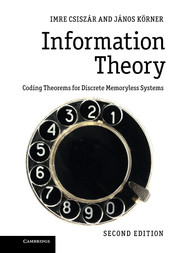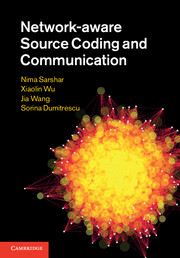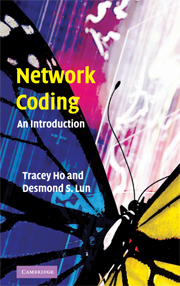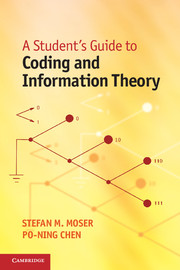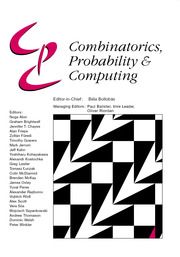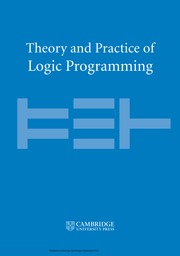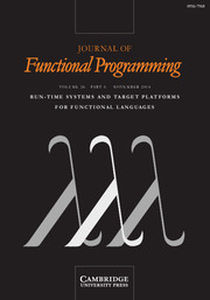Information Theory
Coding Theorems for Discrete Memoryless Systems
2nd Edition
- Authors:
- Imre Csiszár, Mathematical Institute of the Hungarian Academy of Sciences
- János Körner, Università degli Studi di Roma 'La Sapienza', Italy
- Date Published: January 2016
- availability: Temporarily unavailable - available from TBC
- format: Paperback
- isbn: 9781107565043
Paperback
Other available formats:
Hardback, eBook
Looking for an inspection copy?
This title is not currently available for inspection. However, if you are interested in the title for your course we can consider offering an inspection copy. To register your interest please contact [email protected] providing details of the course you are teaching.
-
Csiszár and Körner's book is widely regarded as a classic in the field of information theory, providing deep insights and expert treatment of the key theoretical issues. It includes in-depth coverage of the mathematics of reliable information transmission, both in two-terminal and multi-terminal network scenarios. Updated and considerably expanded, this new edition presents unique discussions of information theoretic secrecy and of zero-error information theory, including the deep connections of the latter with extremal combinatorics. The presentations of all core subjects are self contained, even the advanced topics, which helps readers to understand the important connections between seemingly different problems. Finally, 320 end-of-chapter problems, together with helpful hints for solving them, allow readers to develop a full command of the mathematical techniques. It is an ideal resource for graduate students and researchers in electrical and electronic engineering, computer science and applied mathematics.
Read more- Fully updated and revised edition of a classic book in the field
- Presents deep insights and expert treatment of the key theoretical issues, from two of the field's pioneering researchers
- Includes new, unique coverage of information theoretic secrecy and zero-error information, and provides 320 end-of-chapter problems, with helpful hints for solving them
Reviews & endorsements
'The classic treatise on the fundamental limits of discrete memoryless sources and channels – an indispensable tool for every information theorist.' Segio Verdú, Princeton University, New Jersey
See more reviews'Information Theory: Coding Theorems for Discrete Memoryless Systems, by Imre Csiszar and Janos Korner, is a classic of modern information theory. 'Classic' since its first edition appeared in 1979. 'Modern' since the mathematical techniques and the results treated are still fundamentally up to date today. This new edition was long overdue. Beyond the original material, it contains two new chapters on zero-error information theory and connections to extremal combinatorics, and on information theoretic security, a topic that has garnered very significant attention in the last few years. This book is an indispensable reference for researchers and graduate students working in the exciting and ever-growing area of information theory.' Giuseppe Caire, University of Southern California
'The first edition of the Csiszar and Korner book on information theory is a classic, in constant use by most mathematically-oriented information theorists. The second edition expands the first with two new chapters, one on zero-error information theory and one on information theoretic security. These use the same consistent set of tools as [the first edition] to organize and prove the central results of these currently important areas. In addition, there are many new problems added to the original chapters, placing many newer research results into a consistent formulation.' Robert Gallager, Massachusetts Institute of Technology
'The field of applied mathematics known as Information Theory owes its origins and early development to three pioneers: Shannon (USA), Kolmogorov (Russia) and Rényi (Hungary). This book, authored by two of Rényi's leading disciples, represents the elegant and precise development of the subject by the Hungarian School. This second edition contains new research of the authors on applications to secrecy theory and zero-error capacity with connections to combinatorial mathematics.' Andrew Viterbi, University of Southern California
Customer reviews
Not yet reviewed
Be the first to review
Review was not posted due to profanity
×Product details
- Edition: 2nd Edition
- Date Published: January 2016
- format: Paperback
- isbn: 9781107565043
- length: 520 pages
- dimensions: 248 x 174 x 24 mm
- weight: 1.03kg
- contains: 53 b/w illus. 347 exercises
- availability: Temporarily unavailable - available from TBC
Table of Contents
Part I. Information Measures in Simple Coding Problems:
1. Source coding and hypothesis testing: information measures
2. Types and typical sequences
3. Some formal properties of Shannon's information measures
4. Non-block source coding
5. Blowing up lemma: a combinatorial digression
Part II. Two-Terminal Systems:
6. The noisy channel problem
7. Rate-distortion trade-off in source coding and the source-channel transmission problem
8. Computation of channel capacity and ∆-distortion rates
9. A covering lemma: error exponent in source coding
10. A packing lemma: on the error exponent in channel coding
11. The compound channel revisited: zero-error information theory and extremal combinatorics
12. Arbitrary varying channels
Part III. Multi-Terminal Systems:
13. Separate coding of correlated source
14. Multiple-access channels
15. Entropy and image size characteristics
16. Source and channel networks
17. Information-theoretic security.
Sorry, this resource is locked
Please register or sign in to request access. If you are having problems accessing these resources please email [email protected]
Register Sign in» Proceed
You are now leaving the Cambridge University Press website. Your eBook purchase and download will be completed by our partner www.ebooks.com. Please see the permission section of the www.ebooks.com catalogue page for details of the print & copy limits on our eBooks.
Continue ×Are you sure you want to delete your account?
This cannot be undone.
Thank you for your feedback which will help us improve our service.
If you requested a response, we will make sure to get back to you shortly.
×
